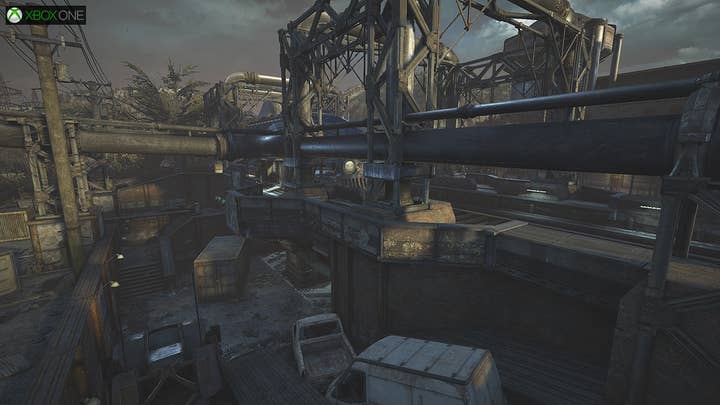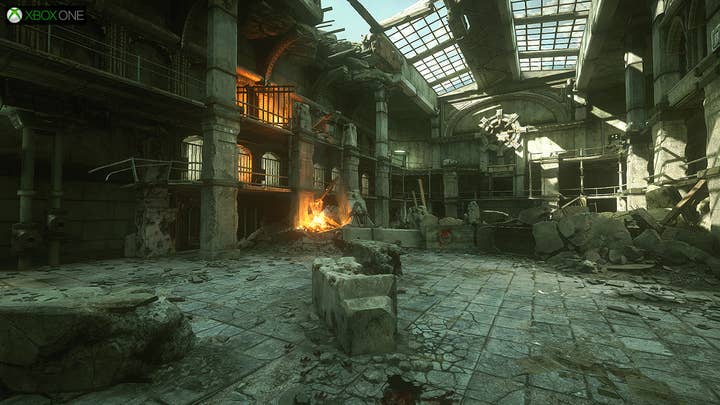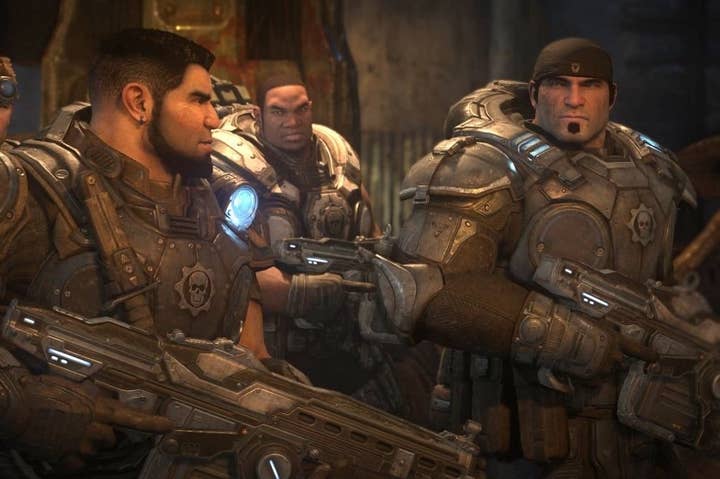Gears Of War Ultimate is The Coalition's bootcamp
Rod Fergusson explains how the remake is helping his team prepare for Gears Of War 4
The fact that the original Gears Of War was released in 2006 sounds like a fact from a 120 Things To Make You Feel Old list. What should make you feel even older is it's now due a remake from The Coalition (formerly Black Tusk Studios) ahead of the release of the newest game in the franchise, Gears Of War 4.
We spoke to studio head Rod Fergusson, a man who has worked on all the Gears Of War games to date, about who he thinks will be playing the game this time around, and why remaking the original was a key step in the development of Gears Of War 4.
Originally it was for the person who's played it all, the big Gears Of War fan. We were very dedicated to that idea of bringing Gears back to the new platform and we want to be an on-ramp back into the franchise.
So how can I bring them back into the fold as quickly as possible? Well let's remake one of the games! So it made sense to do this and as we thought about it, it made sense for that original fan. But as we started to talk to people and we started to look at positioning and started meeting people at Comic-Con you realize that people who now want to play this thing, when it first came out were eight years old.
"One of the targets for this was to get a new team to be soaking in the IP of what it was to make a Gears Of War"
When I was making Gears 3 I would ask people where they started and a lot of people started with Gears 2. Because playing it online is a social dynamic and so when Gears 2 came out people would go online and see their friend list full of Gears 2 and they wouldn't go, "well, I'm going to go play Gears 1 before I join them." So they would join them and then just move forward. It was interesting that even people who've been with us a while and may have played Gears 3 may not have played Gears 1 and so this felt like that too.
One of the other targets for this was to get a new team to be soaking in the IP of what it was to make a Gears Of War game. We had a studio that had never made a Gears game before so this was a way to dissect and reverse engineer a lot of things. So you could look at it and go, oh I know how to make a Gears Of War game, I have to think about these things and I have to think about cover distances and counter distances and how you spawn waves in, and how the guitar riffs work to tell you that you've finished. There's all these things that this was a boot camp for the studio to get ready for making Gears 4.

That's where we get into the idea of the remake versus the remastered. One of the things that we really wanted to push it as far as we could and that's why we took all 3000 art assets and rebuilt them from scratch. We took all the cinematics and took them down to just to VO. All that was re-mocapped and we remastered things in 7.1. There's basic things we were afraid of losing like - I didn't change the dialogue very much because, right or wrong, good or bad, that's its character.
It felt like we really had to take all that content we had out there, like remaking all 19 multi-player maps, taking that two hours of PC content, putting it in for the console players who had never played it before, and putting it in the story where it belongs. The reason that existed is because it got cut from the original so it was bringing back content that was meant to be in that story. So it was just the amount of effort and work we put in to it, how far can we actually push this and still make it for the timeline we wanted to make it in and I think that's what you see here.
"If Gears was realistic you wouldn't be running around in giant metal moon boots right?"
From when I started it was 18 months total. It was 10 months of production but there was a lot of pre-pro that we had to do. And there was a lot of stuff, one of the things as part of the boot camp for the team, some things took longer just because it was a learning. Having to think about it philosophically, what does it mean to make Gears game? The Coalition has been working an IP that is a little bit more reality based, and so I think one of the first questions I got from the artists was, "so how does the gun attach to his back?"
And I'm like, "I'm sorry?" "The gun how does it attach? Is it a magnet is it a hook?" "No it's a game, it just goes on his back."
We had no technologies for that. So, it was part of that, finding these sort of notions of believability and realism and how, where you walk the line on that. It's like, if Gears was realistic you wouldn't be running around in giant metal moon boots right? Boots are the most important thing for a soldier and it wouldn't be steel boots you'd be running around in. But a lot of what made Gears, Gears was that it looked cool or felt cool. So that was something that was part of the boot camp. Sometimes you have to look at Gears and just say, it's that way because it's Gears, it just looks cool.
I did several studio-wide talks and some of the early ones were around branding, here's what the brand of Gears Of War means. And then we got into pillars and very specific topics about here are the things, Gears Of War is brutal, it's heavy, it's grounded and what those words mean. One of the things we did was put up pillar documents that explained here's what our mission is and how we live within that in the Gears world. Hung them up on walls to remind people what you're building.
A lot of times when you bring a new team to this sort of thing they're like, how can I innovate and really change it and make it my own? And you're like, I hear you but first we have to do it right before we do it different. And so it was really focused on here's the sandbox you can play in, here's how far we can push and generally a lot of it was we locked collision on the levels, what level is the level. We took the actual Gears 1 simulation from Unreal Engine 3 and we kept that pure and then it was just, okay now build the art up around it and replace all the assets as opposed to, okay let's go on back and reimagine that gameplay.

It's really great. I mean I've been working on Gears Of War for eight years, and so to be able to stay in it is good. It's a game I love to make and there's so much of me in that and so to go back and fix things, especially the cinematics, so that was one of the great things. Working with Kyle to be able to sit down and say, hey we were trying to say this but because of either tech reasons or because there was a misunderstanding or we ran out of time it never got across. So then Kyle and I can go and fix a bunch of different things. And made things make more sense and feel the way we wanted to. Because now we can show the high level of emotions we can get really close to the face because we have high resolution characters with very detailed facial animation.
So it's just rewarding to go back and sand off some of the rough edges and bring it to a new audience.
Obviously it's changed a lot when you look at things like Call Of Duty, I think there's a push for realism and I think even Call Of Duty is changing that now with exoskeleton suits and all that sort of stuff. I always felt like we were a respite from that. I still feel like that's our role, is to take a break away from the hyper real shooter and go to a place that's stylized and exciting and visceral and empowering and to be with people that even though you're in a dark place, you're with people you like to hang around with and like to hear them talk to each other and that sort of thing.
I think its role in the shooter world, I think it's the same. It's a break from that side of the house. I think being third person and being timing shoot a little bit and having a different style of game-play. It's a stop and pop versus a run and gun. I feel like when you look at it and you compare it against ... almost in every choice we're the opposite so I think it still serves that role.
"I still feel like that's our role, is to take a break away from the hyper real shooter and go to a place that's stylized and exciting and visceral"
You look at where stories have gone over the past ten years, you go from black and white stories to stories with gray and the notion of moral ambiguity and these sorts of things that make them interesting. And so that's things you have to start thinking about how do you make a more sophisticated story but at the same time not lose what makes Gears, Gears. You want to have that tongue in cheek, you want to have that banter, you want to have that dark humor but you want scary, and bump in the night, and scary monsters.
That's the thing I always try to make sure, is that we just don't take ourselves too seriously because if you start to take yourself too seriously then, I don't know, people start to look at you differently and go, you know you're chainsawing monsters right? You know, that kind of thing.
Pretty much in every aspect that we touched it helped inform. We had a diverse set of people from a bunch of different companies and studios that all made games differently. So one of the things for us was figuring out a cinematic pipeline, a level design pipeline, a character creation pipeline. These were things that took a while to figure out. Even just Marcus took forever because when you apply, hey let's make him a little bit more believable, all of a sudden you lose Marcus as a character because it's not the same face. And so, everything we touched informed how to build.
And so as we go from Unreal Engine 3 to Unreal Engine 4 there's still things that are going to change so its not exactly the same but laying down, this is how we as a team need to work and having a goal that the team has risen to accomplish and having a win on our side. It feels really good to have that momentum going into Gears 4 and having all that groundwork and foundation work already put in place.

